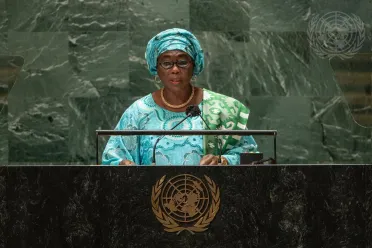Statement
Statement summary
ISATOU TOURAY, Vice-President of the Gambia, said the world’s current challenges require building resilience, recovering from COVID-19 and creating sustainability in response to the people and planet’s needs, necessitating a revitalized United Nations. Africa is grappling with the negative effects of conflict and insecurity, and greater global solidarity and United Nations leadership is required to address the root causes. Conflict remains a major obstacle to development, she said, calling on the international community to act coherently and adopt new approaches that suit today’s demands with a view to realizing the Sustainable Development Goals and the African Union’s Agenda 2063, including the “Silencing the Guns” initiative. Offering other suggestions, she said partners should adopt a conflict-sensitive lens to development programming, including approaches prioritizing transformation and sustainability to help African countries in their post-pandemic recovery and long-term development.
She voiced deep concerns about challenges surrounding COVID-19 vaccine access and equity, abject poverty, youth unemployment and the crushing debt crisis. Building back better from COVID-19, reviving the momentum towards realizing the 2030 Agenda and addressing ongoing development challenges requires extraordinary international engagement and solidarity, and delays in tackling these issues would have devastating consequences on African nations’ economies. Calling for a new strategic orientation and partnership to accelerate post-pandemic recovery, she said initiatives should, among other things, focus on job creation, digitalization and scientific research. Global recovery will only be achieved when vaccine equity, availability and accessibility are adequately addressed for all nations, she said.
COVID-19 has challenged the world to mobilize all efforts to eradicate poverty and inequalities through collective action with a renewed momentum towards achieving the 2030 Agenda, she said, calling on partners to increase funding to help the United Nations development system work. The pandemic disrupted economies and employment, resulting in negative-3.4 per cent drop in Africa’s gross domestic product (GDP) in 2020. The Gambia reviewed its national development plan and is redefining strategic priorities. Many least developed countries face significant pandemic-triggered economic consequences, she said, adding that the international community must recalibrate and commit to actions that support a resilient recovery. Governments must be equipped with tools and adequate resources to finance development priorities. At the same time, collective security continues to be tested, in Mali and other nations, she said, noting the Gambia’s troop contributions to peacekeeping operations. Right now, the Gambia is at a crossroads, seeking national reconciliation and consolidating the rule of law as it prepares for presidential elections in December.
Developments within the international community continue to be a matter of concern to the Gambia, she said, pointing to stalled Israeli-Palestinian peace talks, the plight of the Rohingya people in Myanmar and the decades-long United States embargo against Cuba. Her country is strongly committed to the principle of recognizing only one China. Well aware of the geopolitical competition for influence by regional and global Powers, she said the Gambia, like other small States, is more interested in seeing the influencers cooperating in fighting poverty, climate change, conflicts and global insecurity. “We want to see a world of shared prosperity and innovation; we share a planet, and we owe it to posterity to leave it in a better shape,” she said. “Let us eliminate this pandemic together and build forward better by leaving no one behind.”
One of the pandemic’s biggest lessons is that the world’s institutions are not fit for purpose, she said. This must engender critical reforms of these institutions so the world is better prepared for the next pandemic, climate event or humanitarian catastrophe. United Nations reform is essential, she said, expressing support for the United Nations Development Programme (UNDP) efforts to adapt in ways that are mitigating the pandemic’s impact on developing countries. One of the last holdouts for reform is the Security Council, alongside Africa’s quest for greater representation, which is legitimate, just and overdue. “We will not relent until our demands are met. We want to have a greater voice in deciding issues that affect us,” she said, calling on States to support these demands based on the Ezulwini Consensus and the Sirte Declaration.

